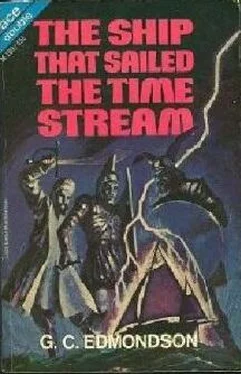After a moment’s internal debate Joe decided against setting the spinnaker. They could probably catch the stubby little merchantman without it and he didn’t want to worry about hundreds of yards of flapping canvas, should they have to come about suddenly.
Visibility was still less than two miles and the ship had disappeared several minutes ago. Joe thought about firing up the radar but he didn’t want to waste power.
He’d sail an hour toward where they had disappeared first. He took the helm himself and tried to piece together what he knew about the other ship and the men who sailed her.
Dr. Krom lit his pipe. “Looked like something out of the Hanseatic League,” he guessed. All hands Crowded aft into the cockpit, eager for any scrap of information.
“It’s not a Hanse ship,” Joe said.
Dr. Krom raised his eyebrows. He hadn’t really expected this navy-minded oaf to know what he was talking about.
Joe took a deep breath. “The ship we’re following,” he began, “is a knarr. They averaged eighty to ninety feet, carried a single square sail on a short, heavily shrouded mast. Bow and stern are pierced for eight oars which are used only when docking. The decking amidships is removable to load cargo.”
Every time Joe made one of these impromptu lectures he was dogged by the suspicion that he was a showoff—the kind of pompous fraud who’d shill for a rigged quiz show. He knew perfectly well he wasn’t a genius; he was merely cursed with a good memory. But even Dr. Krom was impressed so he continued. “My noon shot placed us on a latitude corresponding to the Gulf of Finland, Davis Straits, Hudson Bay, the Bering Sea, or the North Atlantic. The knarr was used to transport merchandise from and to Iceland and the longship, according to all the books, was used only on raids between the Scandinavian peninsula and the British Isles. Since knarrs bound for Iceland commonly took their departure from the Shetlands or the Orkneys, I’d guess we’re somewhere north of Scotland. And in time, we must be somewhere between nine and twelve hundred A.D.”
“Whooee, Mr. Rate, what’s a smart man like you doin’ in the navy?”
Joe eyed the little Cajun sadly. What indeed? As a boy he had patiently cluttered his mind with useless facts for it was axiomatic that education brought wealth and position. Once in a while he’d wondered a trifle worriedly how all this was to come about. Meanwhile, he’d read more history than was required. It was the only reading he did strictly for kicks. He’d felt guilty about this for his father had often told Joe that one never acquired wealth and position by having fun.
And then Dr. Battlement had channeled the young man’s aimless reading by painting glowing pictures of the academic life. Joe decided to become a professor.
Various factors entered into this watering down of the young man’s dream. There was his aptitude for languages, his love of history, and his absolute incapacity to find any joy in transferring dollars from one ledger to another via the legal loopholery of modern business.
The decision was not, of course, arrived at overnight.
There were mornings of chill self-analysis while shivering through Naval ROTC drill. It was an inch by inch retreat from cherished, if undefined, dreams—a battle which ended in capitulation when increasingly frantic study of want ads during his final semester showed no openings for historians or specialists in dead languages.
Joe became an assistant. His future was assured. In ten years his salary would climb nearly to that of a union plumber. But there were other things entailed in being one of Dr. Battlement’s Bright Young Men. Even professors cast desirous loots on the opposing sex. Worse still, they have been known to marry and procreate their kind. Dr. Battlement had a daughter.
Ariadne Battlement was small, dark, and protective.
Her capable hands were forever refolding the handker-chief in a father’s pocket or straightening the tie of a Bright Young Man. Joe rather liked her.
But when invitations to dine with the Battlements became frequent he turned restive. When Ariadne started sewing his buttons and turning his collars the young man panicked. After a night of floor pacing and soul searching he controlled his first blind impulse to hop a freight. When the office opened at 8 o’clock Joe was there.
“I want to join the navy,” he had said.
The Alice was making eight and a half knots under all plain sail. Her crew was making countless decibels, playing endless variations on “impossible; couldn’t happen to us!”
“What more proof do you need?” Joe asked. “Those lads we rammed were playing for keeps. And Freedy can’t fix the radio. Can you?”
Freedy shook his head.
“There’s nothing wrong with it; just no station to hear or answer us.” Joe sighed. They were shocked but he still couldn’t make them believe it. Dr. Krom mumbled something.
“We’ll have our final proof soon.” Joe studied his watch. They had been sailing across the wind for fifty minutes. “Was the yard squared when they first saw us?” he asked. Schwartz nodded. “They were running straight before the wind.”
Joe knew he was building a case on very little evidence but the knarr was probably bound for Iceland.
The Norse had only seen the Alice with sails furled and could have no idea of her true speed. They had merely operated on the fine old premise that a stranger was an enemy and taken evasive tactics. Once out of sight they would probably revert to their original course.
He wondered if the Norse sailors had an hourglass aboard.
Fifty-eight minutes ticked up on his watch. “Slack sheets,” Joe yelled. With the main boom straight out the blanketed jib hung limp and the yawl tended to yaw like a drunken skater from the unbalanced push of main and jigger.
“There they are!” Villegas yelled. “Dead ahead.”
Joe felt the wave of admiration which passed through his crew. He was acutely aware of his status as a boot ensign and tried to show no emotion. “All hands lay aft,” he called.
“Something tells me,” he began, “that we’re going to need an interpreter. How many languages have we among us?”
There was silence.
“Gorson?”
“Sir?” It was the first “sir” Ensign Rate had ever extracted from the bos’n.
“How about you? Norwegian or Swede?”
The bos’n spread his hands. “Used to understand it.
I dunno any more.”
“Guilbeau, you speak something that might pass for French.” The Cajun nodded. “Cook?”
“Cain’t even talk English good,” the cook shrugged.
“Rose?”
“If they’re Hebrews I’m your man,” the engineman offered.
“Schwartz?”
“Don’t look at me,” Seaman Schwartz said.
“McGrath?” McGrath shook his head.
“Freedy?”
“No, sir,” the radioman said.
Joe sighed. More and more it seemed he was going to have to carry the ball. He turned to the civilians. “How about you, Dr. Krom?”
“Russian, French, German and Hungarian,” the oceanographer said.
“No Latin or Greek?”
“They were not required for my specialty.”
“Lapham?”
Dr. Krom’s assistant was a hornrimmed type straight from college who had infiltrated the lab’s personnel via its summer employment program. Twenty-five percent of his time aboard the Alice was spent struggling with his queasy stomach. The other seventy-five percent, he was actively seasick. “Pig Latin?” the unhappy young man offered.
A stern chase is always a long chase but to Joe it was not long enough. An hour halved the distance between them and the knarr and he still had not the slightest idea what he would do when the eventual meeting took place.
Читать дальше











